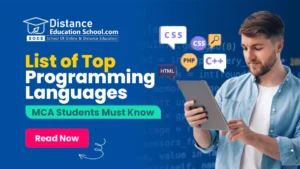

MCom Courses with Distance Education | Jobs After MCom and Salary
MCom Courses are valuable degree programs for students that want to gain an understanding of the fields of finance and banking. also to students who are interested in the economy and taxation laws.
So, students that are not able to complete their MCom degree program in regular mode can opt for an MCom distance education course. As in MCom distance education, students do not have to go to a regular college.
Furthermore, their MCom degree program is popular and one of the most sought-after post-graduation courses in the country. Also, students opt for this program because there is a huge demand for MCom graduates in the field of finance.
Therefore, the following content has vital information on MCom course details and MCom course duration. Also, you will have a condensed understanding of Jobs after MCom and Salary.
Table of Contents
What are MCom Courses with Distance mode?
MCom stands for Master of Commerce. The MCom is a post-graduation course in the commerce discipline. So, in this program, students learn about the advanced and complex concepts of banking and finance. Also, the MCom degree program imparts students with expertise in the corporate world.
Therefore, in the MCom distance education program students complete their MCom degree from home. Also, students stay in contact with their teachers and learn from them by attending online classes through video conferencing. Furthermore, distance education enables students to work for their passions or attain expertise in other useful skills. Also, students can work on a job and complete their distance education MCom simultaneously.
Besides that, MCom is a prestigious and valuable course in terms of comprehension and career prospects. Hence, students get plenty of job opportunities in the field of banking once they complete their MCom graduation degree.
Why should I Enroll in a Distance Education MCom Degree?
- MCom course fees are one of the major reasons to opt for this program as it is less expensive than traditional education systems.
- The distance MCom degree will be valid for getting a job or pursuing higher education.
- You can get many job opportunities once you accumulate your distance MCom degree.
What are the Subjects in the Curriculum of the MCom Courses Program?
There are some variations in the subjects of the MCom courses from college to college. However, some core subjects are the same for all colleges.
Hence, some of the core subjects in the MCom distance education course are:
- Computer Applications in Business
- Financial Management
- Accounting and Managerial Decisions
- Management Concepts and Organization Behavior
- Corporate Legal Environment
- Managerial Economics
- Statistical Analysis
- E-Commerce
- Corporate Financial Accounting
- Business Environment
- Strategic Management
- Economics of Global Trade and Finance
- Corporate Tax Planning
- Marketing Behavior.
Additionally, the MCom course has some elective subjects that students can pursue, such as Research Methodology in Commerce, Commercial Bank Management, International Finance, Financial Markets, Commercial Bank Management, Human Resource Management, Entrepreneurial Management, Financial Bank Management, Investment Management, and Income Tax.
How many Specializations are there in the MCom Degree Course?
Students can opt for any speculation in the MCom course. So, the specializations in the MCom degree program are:
- Marketing
- Finance
- Taxation & Insurance
- Computer Applications & Information Technology
- Human Resource Management
What are the Employment Opportunities for those in the MCom Degree Program?
There are a plethora of job opportunities in the banking and finance sector once students complete their post-graduate degree in MCom.
Hence, some of the job profiles students can apply for are as follows:
- Management Consultants
- Budget analysts
- Marketing Operations Specialist
- Tax Recruiter
- Tax Advisor
- Public Relations Manager
- Finance Consultant
- Revenue Agents
- Tax Examiners
- Management Associate
- Business Manager
- Teacher/Lecturer, and others
Additionally, the top recruiters of the MCom graduates are:
- Amazon
- HDFC Bank
- SBI
- Punjab National Bank
- TATA Consultancy Services
- National Small Industries Corporation Limited
- Heavy Engineering Corporation Limited
- The Economist Intelligence Unit, and many others
How many Years to Complete and Eligibility Parameters to Enrol in the MCom Courses with Distance mode?
MCom course duration is two years, and the program is divided into six semesters.
Additionally, the eligibility criteria to enrol in the MCom distance education course are:
- Students have to complete their B.Com or any other bachelor’s degree in commerce or mathematics.
- Candidates of any age are eligible to enrol in the distance MCom degree program.
- Students have to complete their previous qualifications from a government-recognized institute.
- Students have to attain the minimum required percentile as per the college’s needs.
What is the Admission Process for the MCom Degree Program?
Students can enrol in the MCom distance education program after completing their bachelor’s degree. Also, students can complete their distance MCom degree from a UGC-DEB university. So, to get admission at any UGC-DEB recognized college – students can visit the official website of the specific college they want to enrol in.
Conclusion
MCom distance education offers students a well-designed curriculum that helps them to attain proficiency in the commerce discipline. Also, in this program students gain the essential skill sets that are beneficial in the corporate field. So, this course enables students to get job opportunities not only in the private field but also in the government sector.
Recent Blogs
UG – Courses
- BA – (Bachelor of Arts)
- BBA (Bachelor of Business Administration)
- BCA (Bachelor of Computer Applications)
- B.COM -(Bachelor of Commerce)
- BJMC (Bachelor of Journalism and Mass Communication)
- BLIS (Bchelor of Library and Information Science)
- BSC (Bachelor of Science in Commerce)
- BSW (Bachelor of Social Work)









